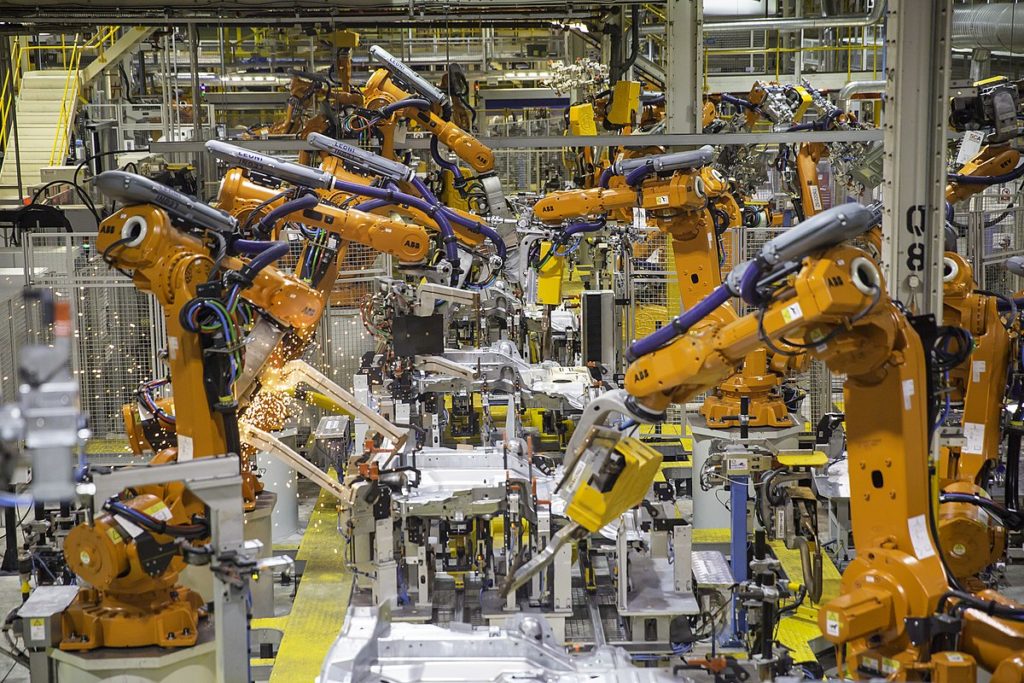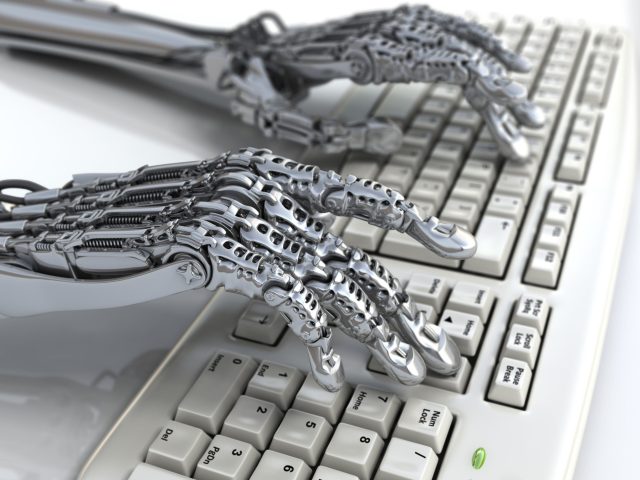Cyborg hands. Credit: Getty Images

Ever since I read Nigel Cameron’s fascinating book Will Robots Take Your Job? not a day passes without wondering why I do not hear a steady ‘clip-clop’ or have to step around piles of horse manure in the streets. I’ve even bought two histories of the horse as my Christmas reading, though I haven’t been on a horse since I was eight.
A major anxiety is whether, in line with the slower-paced First and Second Industrial Revolutions (the Third was digitalisation), artificial intelligence (AI) and robots will render swathes of humans superfluous, though the latter will surely not be converted into dog food in remote plants.
Rather the concern is that in a new age of jobless growth, millions of people will no longer work any more. Being unable to respond to the usual social conversational gambit ‘and what do you do?’ will be the least of their problems, though if Jeremy Corbyn is elected we’ll be able to say ‘we hunt in the morning, fish in the afternoon and literary criticism after dinner’, as Marx once prophesied.
Their sense of self-worth, and quite possibly the integrity of families, will collapse, whether or not these people subsist on the universal basic income which some have proposed; so will traditional social contracts based on reciprocal labour and reward, especially when people are in need. Various (self-interested) prophets of the new societies that Industrial Revolution 4.0 will create imagine a shiny (almost early Bolshevik) utopia. The reality may be pockets of that, walled off from the decay and degradation beyond, as more and more people are ‘left behind’ in ‘flyover country’.
Although the broad contours of Industrial Revolution 4.0 have been known for some time, it is striking that in the UK it is only recently that politicians have begun to address the profound consequences.
The Conservative MP Alan Mak chairs a new all-party parliamentary group on the Fourth Industrial Revolution. Being Anglo-Chinese, Mak is acutely aware of what happened to the world’s largest 18th-century economy when the Qing dynasty’s Qianlong Emperor told western emissaries that he ‘had no use for your country’s manufactures’. Contemporary China is determined not to make the same mistake twice, with a huge $125 billion programme of investment in 3D printing, AI and robotics.

Mak’s technocratic view of ‘what must be done’ is all agog with this dawning age of infinite possibilities, which he construes in conventional terms as a competitive race by nation states to grab a piece of the action. There is the inevitable clarion call: “It is impossible to resist the rise of the machines, so we must let them lift us towards a Global Britain that uses the Fourth Industrial Revolution as a springboard to a more productive, outward-looking economy. This will mean new trading opportunities, more jobs, rising living standards, and more money for our public services.”
Mak’s Labour colleague, Chuka Umunna, chairs a similar committee on social integration. He is also concerned with Industrial Revolution 4.0, but from the perspective that this world of “boundless opportunity” could result in “unpredictable levels of disruption” as science fiction becomes fact at an alarming rate. Umunna worries that abandonment of the social contract would be “a victory for selfish individualism, where society can wash its hands of responsibility for the poor, and the jobless can be abandoned….neighbourhoods would become impoverished reservations of the dispossessed, subservient to and totally dependent on the state”.
While we should be grateful that any politicians are lifting their horizons from the hourly business of seeking tactical advantage over opponents (or their own party colleagues), not much of this debate is informed by historical knowledge of how technological change is received in complex societies. Or, for every historian should ask this, whether historical analogies and exemplars are irrelevant to transformations that are total.
I doubt whether Mak or Umunna have heard of Calestous Juma, the Kenyan-born director of Science, Technology and Globalisation Project at Harvard’s Kennedy School. Professor Juma has many areas of interest – for example he is sceptical about the claim that developing countries will simply leapfrog the West, making a virtue out of poor infrastructure as mobile phones are used for banking, to transmit novel information about agriculture or maps showing checkpoints where the police will demand bribes from drivers of tomato loaded trucks.

Juma is also the author of a remarkable book, Innovation and Its Enemies: Why People Resist New Technologies. He does not tell the familiar tale of the Luddites smashing mechanised looms and shuttles. Instead, he examines the entirely rational reasons why governments and people resisted various innovations, including printed books, coffee, electricity, margarine, tractors, and recorded music, while sometimes employing utterly irrational prognoses about their effects.
As you sip your cinnamon-dusted latte, spare a thought for those women in Caroline England who petitioned Charles II that coffee – “a little, base, black, thick, nasty, bitter, stinking, nauseous puddle-water” – might turn you brown-skinned (for it came from Turkey via men like ‘Jacob the Jew’ who ran Oxford’s first coffee house) or make (men) impotent. Hence it should be restricted to the over-sixties. There were not many of the latter at that time.
Apart from fears of communal sedition, for people met in coffee houses to discuss things soberly, many vested interests were affected by the introduction of coffee. They included brewers, those who caught and sold salted herrings to make one want to drink more beer (the early version of salted crisps) and tavern keepers. Frederick the Great was so exercised by money leaching out of Prussia through coffee imports that he employed street sniffers to smell people for traces of the beverage.
The US dairy industry also fought a mighty campaign against margarine in the 1800s. This was held responsible for baldness as well as sterility, since it allegedly contained the remains of dead cows, dogs, pigs and horses, rather than hydrogenated coconut oil. Not only was margarine sold with warning labels, but it was dyed bright pink and sold in tubs with black markings to deter consumers looking for a cheaper substitute for butter.
Juma uses the history of recorded music to underline that it is not solely the technology that threatens livelihoods, in this case that of live-performing musicians. The phonograph took off from around 1900, though initially because sound technology was so poor, live musicians were still preferred in all cinemas and on most radio programmes. The advent of the jukebox killed them off in most bars and clubs. In the US musicians were exceptionally well organised, with two separate labour unions. In 1942 they went on strike and refused to record their music, a move copied by unions in Britain and Puerto Rico. The strike lasted for two years, with first Decca and eventually Columbia and RCA Victor agreeing to royalty payments from their record sales. There was another win. Since it cost so little to make a record, small enterprises were formed to record minority music, notably jazz and blues, which then through radio found much wider mass audiences.
The broader point of Juma’s book is that all technological change happens in a broad social context rife with vested interests – from brewers to labour unions – all capable of playing on unrelated anxieties, for – contrary to the Daily Mail – coffee does not make men impotent. The new technology also sits within business models more complex than itself, for Uber is not just a car-hailing app but involves GPS, algorithms, cars and drivers. The problem nowadays is that the rate of technological change is accelerating with unprecedented velocity, faster than human beings can learn themselves. Globalisation also means that production is radically de-centred from advanced economies, though future developments may reverse that, from 3-D printing to hydroponic agriculture that may make conventional ‘trade’ redundant.
Juma’s book is about resistance as well as almost evolutionary adaptation to technological change. Apart from the fact that change is so fast nowadays, there is another problem. The old communal ties that bind are diminished, be it churches or trades unions. While it is certainly true that social media facilitate other forms of ‘virtual’ togetherness, from crowd funding to petitions, the technology itself means we are often lost in the machine.










Join the discussion
Join like minded readers that support our journalism by becoming a paid subscriber
To join the discussion in the comments, become a paid subscriber.
Join like minded readers that support our journalism, read unlimited articles and enjoy other subscriber-only benefits.
Subscribe